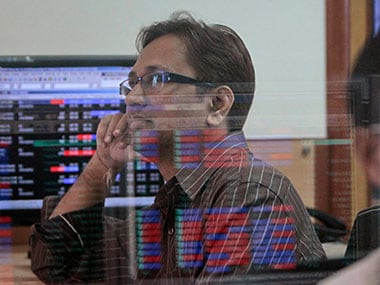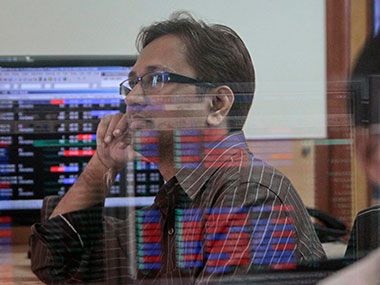Erasing gains in the opening session, Sensex was 0.14 percent up at 40,970.33. Later, the Sensex is up 71.82 points or 0.18 percent at 40985.64, and the Nifty up 9.90 points or 0.08 percent at 12045.70. Wipro share price declined 2 percent after chief executive officer (CEO) and managing director (MD) Abidali Z Neemuchwala of the company resigned.
#CNBCTV18Market | Market fails to hold on to opening gains, Midcap Index has turned negative & the #Nifty is swinging between the green & red territories; Tata Motors slumps along with Power Grid, leading losses on index
— CNBC-TV18 (@CNBCTV18Live) January 31, 2020
For more LIVE updates, log on to https://t.co/EnrTPFn6lQ pic.twitter.com/EDo9LK4JHa
Sensex jumped over 200 points in the opening session on Friday ahead of the release of the government’s Economic Survey later in the day. The 30-share BSE index was trading 168.91 points or 0.41 percent higher at 41,082.73, and the broader NSE advanced 39.35 points, or 0.33 percent, to 12,075.15.
#CNBCTV18Market | Indices open higher; Kotak top gainer on the #Nifty after promoter stake overhang ends yesterday, Wipro amid top losers after Abidali Neemuchwala steps down as MD & CEO
— CNBC-TV18 (@CNBCTV18Live) January 31, 2020
For more LIVE updates, log on to https://t.co/EnrTPFn6lQ pic.twitter.com/pRYlCwd4Vm
In the previous session, Sensex settled 284.84 points, or 0.69 percent, lower at 40,913.82, and Nifty closed 93.70 points, or 0.77 percent, down at 12,035.80. Meanwhile, on a net basis, foreign institutional investors sold equities worth Rs 962.28 crore, while domestic institutional investors purchased shares worth Rs 292.35 crore on Thursday, data available with stock exchanges showed. Kotak Mahindra Bank was the top gainer in the Sensex pack, rallying over 4 percent, after private sector lender said it will withdraw a case concerning dilution of promoters’ shareholding in the bank which it had filed against the RBI in the Bombay High Court. Bajaj Auto, IndusInd Bank, M&M, Hero MotoCorp, Bajaj Finance and Bharti Airtel were also trading on a positive note. On the other hand, PowerGrid, ONGC, HCL Tech, NTPC and TCS were in the red. According to analysts, the market is now focused on the Economic Survey and the Union Budget, with high expectations of further stimulus to the economy. Prime Minister Narendra Modi’s government is expected to raise spending on infrastructure and cut some personal tax in its 2020/2021 budget, to spur consumer demand and investment, government sources and economists said to Reuters. [caption id=“attachment_5678251” align=“alignleft” width=“380”]  Representational image. Reuters.[/caption] Much of the expectations around the Budget have been factored into stock prices and investors will wait until the announcement before making any large bets, said Vinod Nair, head of research at Geojit Financial Services in Kochi. “Growth is on the agenda. People want tax cuts, more incentives to industries and the equity markets,” Nair said of the expectations from the Budget. Shares in Kotak Mahindra Bank, one of India’s largest private-sector lenders, were at the top of the Nifty 50 with a 5 percent rise after it received the central bank’s approval to cap its promoter’s voting rights at 20 percent until the end of March. About 23 of the Nifty 50’s 29-point gain on Friday came from Kotak, making it the biggest boost to the index. Recovery global markets too buoyed investor sentiment here, traders said. Rupee appreciates 17 paise The Indian rupee appreciated by 17 paise to 71.41 against the US dollar in early trade on Friday ahead of the release of the government’s Economic Survey later in the day.
#Rupee opens slightly higher against the US dollar pic.twitter.com/R4xoHlbHek
— CNBC-TV18 (@CNBCTV18Live) January 31, 2020
Forex traders said market participants are assessing the economic implications of the coronavirus outbreak and awaiting cues from the Union Budget. At the interbank foreign exchange, the rupee opened at 71.46 and touched a high of 71.41, registering a rise of 17 paise over its previous close. On Thursday, the rupee had settled for the day at 71.58 against the US dollar. The domestic unit, however, could not hold on to the gains and was trading at 71.43 against the dollar at 0959 hrs. Foreign institutional investors (FIIs) remained net sellers in the capital market, as they sold shares worth Rs 962.28 crore on Thursday, according to provisional exchange data. Brent crude futures, the global oil benchmark, rose 1.54 percent to trade at 59.19 per barrel. However, strengthening of the American currency vis-a-vis other currencies overseas weighed on the rupee. The dollar index, which gauges the greenback’s strength against a basket of six currencies, rose by 0.06 percent to 97.92. The 10-year government bond yield was at 6.59 percent in morning trade Asian shares fight for footing after turbulent week Asian share markets battled to regain their footing on Friday as investors clutched at hopes China could contain the coronavirus, even as headlines spoke of ever more cases and mounting deaths. Helping steady the mood were surveys showing Chinese manufacturing activity came in much as expected in January while services actually firmed, though this was likely before the virus took full hold. Indeed, reports some Chinese provinces were asking companies not to re-start until Feb. 10 suggested activity would take a hard knock this month. For now, sentiment got a timely boost when Amazon’s sales blew past forecasts and sent its stock soaring 11 percent after hours, adding over $100 billion in market worth. MSCI’s broadest index of Asia-Pacific shares outside Japan edged up 0.3 percent, but was still down almost 4 percent on the week so far. Its 2.3 percent dive on Thursday had been the sharpest one-day loss in six months. Japan’s Nikkei bounced 1.3%, recouping almost half of its weekly loss. E-Mini futures for the S&P 500 firmed 0.1 percent, having rebounded 0.5 percent late on Thursday. European bourses looked set to open firmer with EUROSTOXX 50 futures up 0.9 percent and the FTSE 0.7 percent. The World Health Organization on Thursday declared a global emergency as the virus spread to more countries. Tedros Adhanom Ghebreyesus, WHO director-general, said the greatest worry was the potential for the virus to spread to countries with weaker health systems. Yet investors took heart from his comments that the drastic steps Beijing was taking would “reverse the tide” and contain the outbreak. “Some shorts covered after the director gave the WHO’s stamp of approval to China’s aggressive containment effort,” said Stephen Innes, Asia Pacific market strategist at AxiCorp. “For now, the market’s risk lights have shifted from flickering on red to a steady shade of amber, which could bring more risk back into play.” That helped Wall Street recoup its losses so the Dow finished up 0.43 percent, while the S&P 500 gained 0.31% and the Nasdaq 0.26 percent. After the bell, NASDAQ futures pushed 1.3 percent higher on the Amazon results. Still, the flow of news on the virus remained bleak with China’s Hubei province reporting deaths from the disease had risen by 42 to 204 as of the end of 30 January. More airlines curtailed flights into and out of China and companies temporarily closed operations, while the US State Department told citizens not to travel to any part of China. JPMorgan shaved its forecast for global growth by 0.3 percent points for this quarter to reflect the growing impact. “Based on the patterns observed from other epidemics, we assume that the outbreak will likely run its course over 2-3 months, meaning the hit to activity happens in the current quarter” JPMorgan analysts said in a note. “Also in line with historical experience, we expect full recovery to follow.” Bonds can’t be beat The drumbeat of bad news kept safe-haven bonds well bid, with yields on US 10-year Treasuries down 9 basis points for the week so far and near four-month lows. The yield curve between three-month bills and 10-year notes had also inverted twice this week, a bearish economic signal. In currencies, sterling held firm after jumping on Thursday when the Bank of England confounded market expectations by not cutting interest rates. The pound was last at $1.3100, a surprisingly steady performance given this is the day the UK officially leaves the European Union. The dollar took a knock overnight when data showed the US economy grew at its slowest annual pace in three years and personal consumption weakened sharply. Yet the dip was brief and it was a shade firmer on the yen on Friday at 109.07. The euro held at $1.1028, while the dollar was steady on a basket of currencies at 97.867. Most of the action this week has been nervous investors selling emerging currencies for dollars and yen, leaving the major little changed against each other. Spot gold was a shade firmer for the week at $1,571.20 per ounce, having failed to get much of a safe-haven bid as a range of other commodities, from copper to soybeans, were hammered by worries over Chinese demand. Oil bounced on short-covering, after hitting its lowest in three months as the global spread of the coronavirus threatened to curb demand for fuel. US crude regained $1.02 to $53.16 a barrel, while Brent crude futures rose 90 cents to $59.19. --With agency inputs


)
)
)
)
)
)
)
)
)



